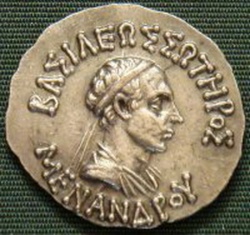Difference between revisions of "Milinda"
Jump to navigation
Jump to search
(Created page with "thumb|250px| Milinda is the Pāḷi rendering of the Greek name Menandros, a Greek soldier in the army of Alexander the Great, who later made himself k...") |
|||
| Line 1: | Line 1: | ||
[[File:Milinda.jpg|thumb|250px|]] | [[File:Milinda.jpg|thumb|250px|]] | ||
| − | Milinda is the Pāḷi rendering of the Greek name Menandros, a Greek soldier in the army of Alexander the Great, who later made himself king of a large part of what is now eastern Afghanistan and northern Pakistan in the 2nd century BCE. Milinda eventually converted to Buddhism, perhaps due to the influence of a monk named Nāgasena, and later both he and the monk were used as the protagonists in a Buddhist book named the Milindapañha. | + | [[Milinda]] is the [[Pāḷi]] rendering of the {{Wiki|Greek}} [[name]] Menandros, a {{Wiki|Greek}} soldier in the {{Wiki|army}} of [[Wikipedia:Alexander the Great|Alexander the Great]], who later made himself [[king]] of a large part of what is now eastern {{Wiki|Afghanistan}} and northern {{Wiki|Pakistan}} in the 2nd century BCE. [[Milinda]] eventually converted to [[Buddhism]], perhaps due to the influence of a [[monk]] named [[Nāgasena]], and later both he and the [[monk]] were used as the protagonists in a [[Buddhist]] [[book]] named the [[Milindapañha]]. |
{{R}} | {{R}} | ||
[http://www.buddhisma2z.com/content.php?id=262 /www.buddhisma2z.com] | [http://www.buddhisma2z.com/content.php?id=262 /www.buddhisma2z.com] | ||
[[Category:Buddhist Terms]] | [[Category:Buddhist Terms]] | ||
Revision as of 07:19, 25 August 2014
Milinda is the Pāḷi rendering of the Greek name Menandros, a Greek soldier in the army of Alexander the Great, who later made himself king of a large part of what is now eastern Afghanistan and northern Pakistan in the 2nd century BCE. Milinda eventually converted to Buddhism, perhaps due to the influence of a monk named Nāgasena, and later both he and the monk were used as the protagonists in a Buddhist book named the Milindapañha.
